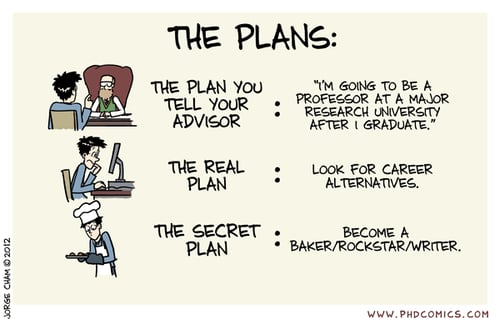Are you getting to the end of your Ph.D. or postdoc and realizing that a career in academia isn’t for you? When you’ve been immersed in an academic environment for so many years, thinking about careers outside of academia can be overwhelming. Here are some suggestions that may give you a starting point in your career search:
- Begin by researching career options and determining which fit best with your interests. In my own experience, I wanted to have a career where I was communicating science and still interacting with the scientific community, so I ended up narrowing down my search to jobs in scientific publishing. There are many different career paths outside of academia, so take some time to find the ones that interest you most.
- Once you narrow down your career options, connect with people in those professions so you can ask questions. You should, first, get an understanding of the day-to-day to make sure the job is a good fit for you, and second, find out what’s required to enter into the field. You can start out by attending career panels and other workshops at your university. Keep an eye out for any events in your area that feature speakers with careers you’re interested in, even if the event is not career-related. For example, I attended a workshop on academic integrity that included journal editors and used that as an opportunity to introduce myself.
- Most researchers have a strong existing academic network from working collaboratively and attending conferences. Take advantage of your pre-existing network to connect with people in non-traditional science careers. Tell your mentors that you are exploring alternative careers and they will likely know someone who has transitioned outside of academia. You may also want to look for networking opportunities beyond your academic network by joining a society or message board for the career you’re interested in.
- Once you’re in contact with someone in your field of interest, ask to set up an informational interview either by phone or in person. An informational interview is an informal way to ask questions about a career without applying for a position. You can quickly gain insight into a new field from a short conversation. This is also an opportunity to introduce yourself and establish a memorable connection. From an informational interview, I was able to reliably learn what would be expected of applicants to editorial positions from a current editor.
- When it comes time to apply for jobs outside of academia, remember not to sell yourself short. You’ve spent years becoming an expert in a narrow field of research, but your skills extend far beyond the techniques you’ve learned. Step back, look at the broader skills you’ve obtained, and see how they apply to the job’s requirements. If you end up being interested in a career path where the usual applicants are not science PhDs, highlight how your Ph.D. experience has trained you to learn quickly, efficiently problem-solve, apply information, and communicate your work.
The job search can be stressful, especially if you’re doing it while finishing your Ph.D. Don’t forget that this is also an exciting time as you take the next step in your career journey.


